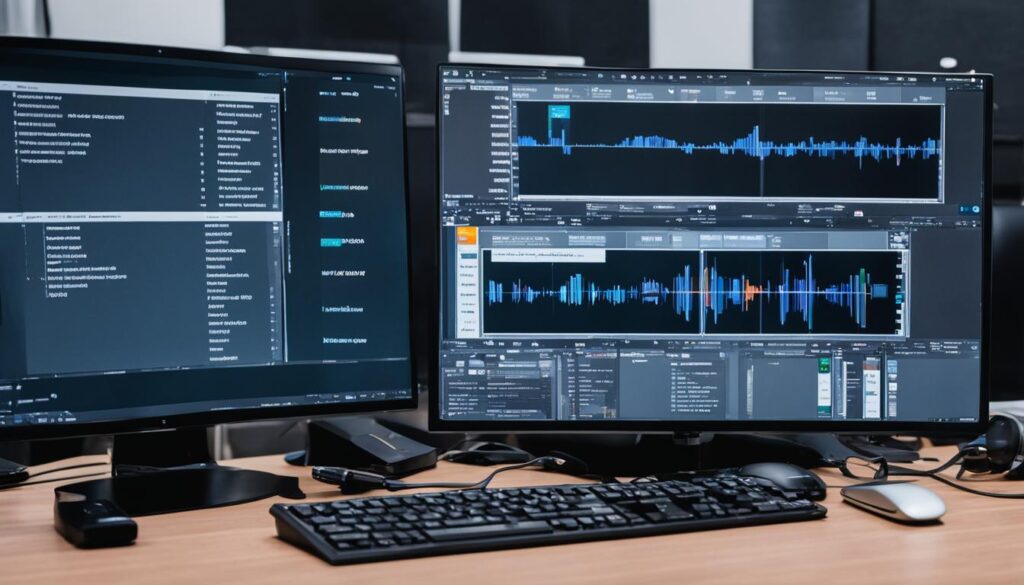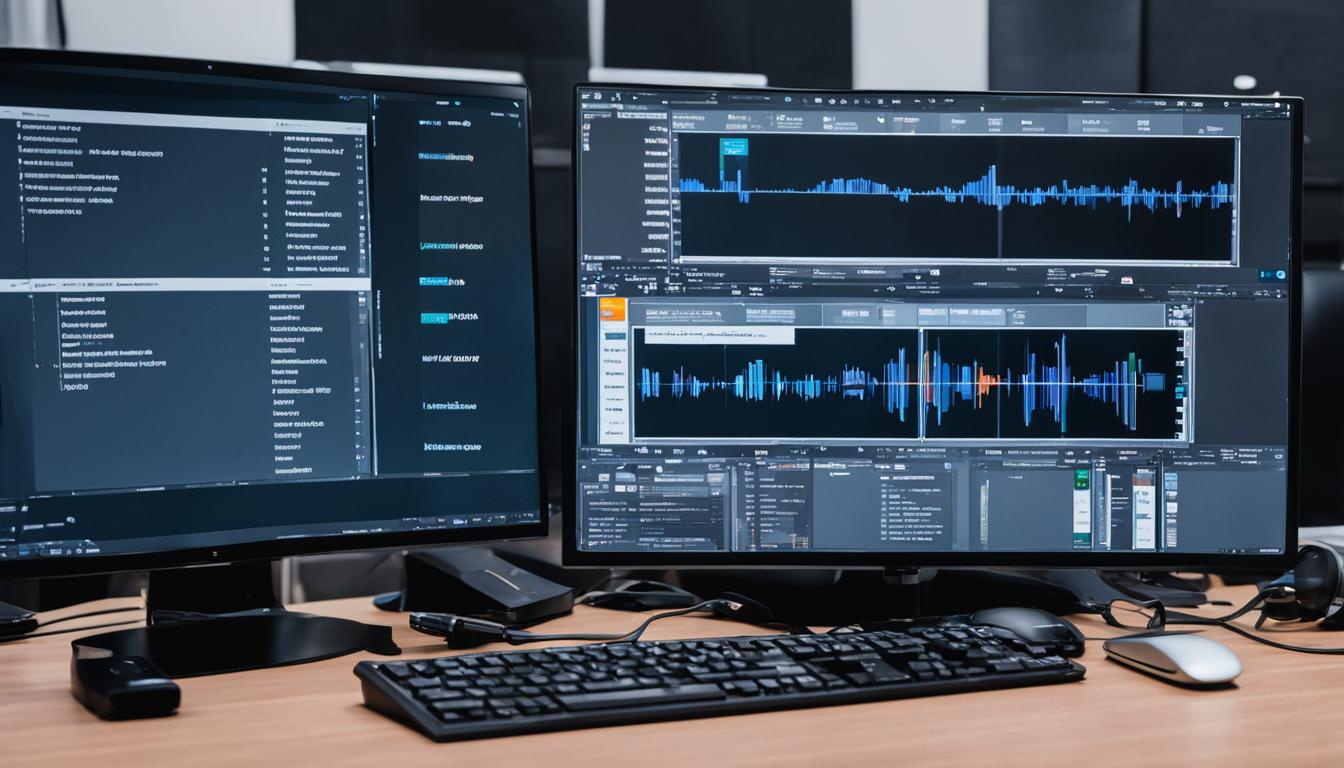As an audiobook narrator, I know how crucial it is to produce high-quality recordings that captivate and engage listeners. That’s why I rely on a variety of software tools to help me enhance my performances and streamline my workflow. From text-to-speech software that helps me practice pacing and pronunciation to audio editing tools that refine the sound of my recordings, there are numerous options available to improve the overall quality of my work.
In this article, I will discuss several essential audiobook narrator software tools that can enhance your performance and take your narrations to the next level. These tools provide valuable resources and features to help you save time and improve your recording quality, so you can create audiobooks that truly resonate with your audience.

Key Takeaways
- Text-to-speech software can help improve pronunciation, pacing, and recording efficiency.
- Audio editing software is essential for polishing and enhancing recording quality.
- Performance monitoring and coaching tools provide personalized feedback to enhance your skills.
- Project management software can assist in staying organized and meeting deadlines.
- Pronunciation and accent guides can help ensure accurate and authentic narration.
Text-to-speech (TTS) software
As an audiobook narrator, I know the importance of accurate pronunciation and proper pacing. Text-to-speech (TTS) software can be a valuable tool for achieving both while saving time during recordings. By converting written text into spoken words, TTS software assists narrators in practicing pronunciations and perfecting pacing. In fact, many TTS software options offer customizable settings that can help tailor and refine narrations.
Popular TTS software includes Google Text-to-Speech and Acapela Group’s Text-to-Speech Voices. These both offer a range of natural-sounding voices, enabling narrators to create unique and engaging listening experiences. By utilizing TTS software, audiobook narrators can meet tight deadlines and focus on perfecting their performance for listeners.
Audio editing software
As an audiobook narrator, it’s crucial to ensure that your recordings are polished and professional-sounding. That’s where audio editing software comes in. With a variety of features such as noise reduction, equalization, and audio enhancement, these tools can help you improve the quality of your work.
Popular audiobook editing software options include Audacity, Adobe Audition, and Hindenburg. Audacity is a free and open-source option that is user-friendly and offers basic editing features. Adobe Audition, on the other hand, is a paid option that is widely used in the audio industry and offers advanced features such as spectral editing and multitrack mixing.
Whichever software you choose, it’s essential to understand how to use its features fully. You can use noise reduction to eliminate background noise, equalization to balance sound frequencies, and audio enhancement to improve sound quality overall.
Additionally, it’s crucial to listen back to your recordings and make notes on areas that require improvement. Using audio editing software, you can make further adjustments and enhancements to get your recordings sounding just right.
Performance monitoring and coaching tools
As an audiobook narrator, it’s essential to ensure that your performance captivates listeners and keeps them engaged. Audiobook performance monitoring tools and narration coaching software can help you achieve this by providing real-time feedback on pacing, tone, and pronunciation.
These software options offer personalized coaching and guidance, enabling you to improve your skills and deliver captivating performances. With features such as pitch adjustment, speed control, and voice recognition, you can polish your performance and ensure maximum engagement with your audience.
One popular performance monitoring tool is Speechelo, which utilizes AI-based speech recognition technology to evaluate the tone and rhythm of your narration. The software offers a range of voice options, including male, female, and child voices, enabling you to select the perfect voice for your audiobook.
Other coaching software options, such as Affective, analyze your recording to provide personalized feedback on your delivery, emotional impact, and tone. These tools are specifically designed to help you improve your narration skills, allowing you to perfect your performance and captivate your audience.
By utilizing performance monitoring and coaching tools, you can enhance your skills and deliver professional-quality performances. These software options provide a cost-effective and efficient way to improve your narration, enhance your audience engagement and ensure a successful audiobook project.
Project Management Software
As an audiobook narrator, I understand the importance of staying organized and meeting deadlines. That’s why project management software designed specifically for audiobook production can be a game-changer. These tools allow me to schedule recording sessions, collaborate with authors and producers, track progress, and manage multiple projects simultaneously.
With audiobook project management tools, I can easily plan out my workload, ensuring that I deliver the finished product on time. Most software options offer user-friendly interfaces, making it easy to navigate and manage projects seamlessly.
Audiobook project management software can assist in managing the complex production process from start to finish. From the initial planning stages to the final production, these tools streamline the entire process. Whether it’s keeping track of deadlines, communicating with collaborators or sharing project files, these tools improve overall project organization and efficiency.
Modern audiobook project management software tools like narration planning software and others even have features such as budget tracking and reporting, which can help identify opportunities to improve profits and reduce expenses. With these helpful tools keeping me on track, I can focus on delivering high-quality performance with the peace of mind that comes with efficient project management.
Audiobook Pronunciation and Accent Guides
As an audiobook narrator, accurately pronouncing words and conveying character accents is critical for engaging listeners and providing an authentic experience. Fortunately, there are numerous software tools and online platforms available to assist in mastering these skills.
Audiobook Pronunciation Guides: Pronunciation guides provide narrators with a reliable and comprehensive source of phonetic information and word pronunciation. These resources offer guidance on commonly mispronounced words, technical terms, and names of people or places. Some popular online pronunciation guides for audiobook narrators include Forvo.com, Merriam-Webster.com, and HowJSay.com.
Accent Coaching Tools for Narrators: Accent coaching tools assist narrators in perfecting character accents and dialects. These tools provide access to audio samples from native speakers, along with guidance on specific pronunciations, pitch, and intonation. Popular accent coaching tools include AccentHelp.com, DialectCoaches.com, and Speechling.com.
By incorporating these resources into your narration process, you can improve your pronunciation and accent skills, ensuring a polished and captivating performance.
